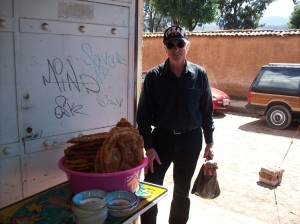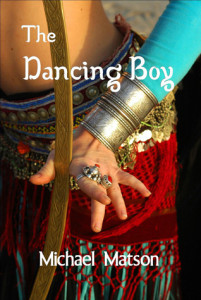Michael Matson was born in Helena, Montana, and was immediately issued a 10-gallon Stetson and a pair of snakeskin boots. After formative years spent in New Jersey, North Carolina, New York, California, Hawaii and Japan, Michael earned a journalism degree from the University of Washington in Seattle. Following a brief military stint in Oklahoma, where he first encountered red, sticky mud, heavy rain and tarantulas, he returned to Seattle and worked as an advertising agency copywriter, creative director and video producer.
In 2007 he (regretfully) left Seattle for Mexico to have time to write and has since published The Diamond Tree, a fairytale for all ages; Bareback Rider, an inspirational adventure for children; and Takeshi's Choice, a mystery novel. His short story “Gato” was selected for inclusion in Short Story America’s 2014 anthology. His second mystery novel: The Dancing Boy, was released by Dark Oak Mysteries, a division of Oak Tree Press in April 2014.
He lives with his wife María Guadalupe (Tai), in Morelia, the colonial capital city of Michoacán, where, despite all the bad publicity given the area by U.S. news media, he has never seen a narcotraficante.
Connect with Michael Matson:
Website: www.findmichaelmatson.com
Twitter: https://twitter.com/bescrito
About The Book
Treat Mikkelson is not exactly a burnt-out case but he’s grown tired of his life as a criminologist, weary of memories of a marriage gone wrong and of his time in Vietnam. Trying to burn the bridges to his past, he finds and remodels a cabin on a small Pacific Northwest Island, settles down to enjoy fishing, setting his crab pot, digging for clams and documenting the lives of his island neighbors.
When an elderly woman in the nearby tourist town of La Conner is found dead however, the victim of what appears to be an accidental fall, Mikkelson is persuaded to look into her death. The discovery that it was murder leads to something even more shocking: the human trafficking of young boys brought into the US and Canada.
Purchase The Book:

Discuss this book in our PUYB Virtual Book Club at Goodreads by clicking HERE
Author Interview
Can you tell us what your book is about?
The Dancing Boy is a mystery that relies on historic fact and current realities to fulfill its objective. For more than 2,000 years some Middle Eastern countries have exploited young boys for sex. Afghanistan today still continues to commit this crime against children. There, pre-adolescent boys are trained to dance, dressed as women, to entertain men. Sometimes they are sold into sexual slavery. The Dancing Boy uses the fact of this practice to tell a story of human trafficking and murder.
Why did you write your book?
The Dancing Boy is my sixth book and grew out of my desire to write a mystery strongly linked to locations in the Pacific Northwest using current events. Many readers from that area have commented that the book brings the locations to life and that the story brought back memories of living there. One has merely to go on the Internet to discover how current the problem of child exploitation is today.
Can you tell us a little about your main and supporting characters?
Aside from the title character, the main protagonist is Treat Mikkelson, a former criminologist, tortured by the long-ago break-up of his marriage and his memories of Vietnam. He has retired to a peaceful life of fishing and writing on a small Pacific Sound island but is drawn into an investigation that leads to the discovery of child smuggling.
Suniko Yamada is a strong secondary character, a free-thinking, motorcycle-loving, computer whiz.
A retired college professor, an apparent burned-out drunk, plays a critical role in the story’s conclusion.
Do you tend to base your characters on real people or are they totally from your imagination?
Just as all politics is local so all writing, I think, is personal and based on empirical knowledge. All of the characters in The Dancing Boy are totally made up of whole cloth. And yet, who knows what level of personal experience created them from my shelves of dusty memory?
Are you consciously aware of the plot before you begin a novel or do you discover it as you write?
I strongly recommend all writers thoroughly outline their stories before putting words on paper. Other writers, that is. I seem genetically indisposed to the idea. I generally have a good idea of the plot and of the ending I wish to arrive at, but the development of the story grows in its own way and at its own pace like some mutant plant, at times totally independent of my wishes.
Does the setting play a major part in the development of your story?
The setting for The Dancing Boy plays a central part in the story. Where the main protagonist lives and why he lives there explain his character. The island-dotted inland waters of Canada and Western Washington have been used by smugglers since the days of prohibition when rum-runners relied on them to mask their movements from the authorities.
Have you suffered from writer’s block and what do you do to get back on track?
Most writers at one time or another reach a stalling point, I think. A “where do I go from here” moment that seems to last too long. One cause probably is that the story itself is at fault. Somewhere the writer has taken a wrong turn and is subconsciously aware of it. At moments like these, one needs to review what’s been written and resolve the conflict.
What do you like the most about being an author?
I believe writers are different than doctors, mechanics, firefighters and others. Those are chosen professions. A writer is a writer whether he or she likes it or not. Just as a fish is a fish. And perhaps the answer to the question could be best answered by your finny pet. Ask your goldfish or neon tetra what it likes most about being a fish and it might tell you, “Well, I like being able to swim around and not having a boss.” That answer works for me too. I like swimming around in my mind to find ideas to develop and, since I react badly to authority, I enjoy not having someone tell me what to do. Of course, like the goldfish, there is that bowl thing to deal with.
What is the most pivotal point of a writer’s life?
I certainly can’t speak for all writers. Writers are individuals and I’m sure every one of them would offer some different event or life experience that they considered a prime motivational point. Some of them, like myself, would possibly cite a childhood filled with books that stirred their imaginations and inspired them to create stories of their own.
What kind of advice would you give other fiction authors?
Read. Write. Edit. Ask friends to read manuscripts and make suggestions. Edit. Read. Write. Edit.




